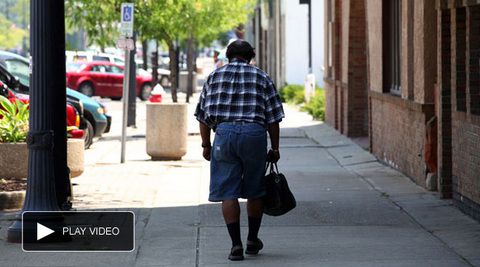Sorry, people, I’m debated out and have overdosed on political analysis after last night’s debate. Here in no particular order are non-debate items that haven’t made my head hurt.
Far be it from me to encourage you to go off to another website — even though it’s my job — but spend a few hours going over the New York Times project on Elyria. It’s gorgeous in its design, heartbreaking in its reality because most of us have our own Elyria. We come from communities that have probably seen their better days, yet struggle to get up every morning with some semblance of optimism that it’s possible they’ll return.
The person who fills the coffee cups at the local diner, full of old men remembering better times, took some classes at the community college after high school, but the optimism of education gave way to the diner.
And there’s the glory of the onetime football player, now the symbol of the racial undercurrent in the town…
The series, centered around a diner, is a sobering antidote to the flag-waving images of America appropriated by the politicians at this time of the year. It’s reality. These are the communities we love, because they’re the ones who raised us.
Tell me about your Elyria? (Here’s mine)
2) IS YOUR COFFEE POT WATCHING YOU?
The day is coming when your coffee pot might alert your doctor that you have dementia. Maybe someday. Wired.com reports that sensors embedded in everyday-life items might reveal the problem…
So far, dwellSense has been tested with 14 elderly people in the Pittsburgh area. In addition to coffee-making and pill-taking, Dey’s group also tracked telephone-dialing. The information wasn’t used for medical purposes, but to see if they tracked with traditional cognitive test results. Dey said they did.
“They correlated very well with occupational therapist results,” Dey said. “It could catch problems more objectively, more quickly, than requiring an occupational therapist visit.”
3) THE GASOLINE PRICE QUESTION
Why do gasoline prices go up faster than they come down? The Los Angeles Times is tackling that question today on the backside of the runup in prices that pushed a gallon of gasoline there to around $6 a gallon in some cases. It says gas station owners don’t drop the price as fast because they don’t want to sell their gasoline already in the tanks for less than they paid for it. But the paper also says it’s your fault, American driver…
Consumers bear some of the blame too, said Matt Lewis, an Ohio State University professor whose specialties include research on retail fuel prices and the behavior of motorists.
Lewis said that drivers who aggressively search for the best prices as they are rising stop once they begin to trickle down again. When a station owner sees customers flocking in after a price drop of just a penny a gallon, they have no incentive to lower their prices faster, he said.
In the Twin Cities, gas prices have been dropping about a penny or two a day, after a 20-cent a day runup a couple of weeks ago.
Remember when many sports teams weren’t scared to get on the “It Gets Better” bandwagon to assure young gay people that suicide as the result of bullying wasn’t the answer? The professionals have walked away from the notion but college sports is still in the game, to their credit.
The newest project is You Can Play. The Miami University hockey team is the latest to support gay athletes, in this case, with a tribute to an openly gay manager who died in an accident.
(h/t: Ben Chorn)
There’s something about hockey. According to the Wisconsin Gazette, and ESPN poll found that “NHL players are the most supportive of equality, with 92 percent of those polled saying they support same-sex marriage. Sixty-one percent of NFL players, 46 percent of NBA players and 45 percent of Major League Baseball players agreed.
General aviation is dying in the United States and elsewhere around the world. There aren’t enough people who want to learn to fly and as the older pilots — the ones who usually got their wings in World War II or with the GI Bill — die, there aren’t many coming along to replace them.
And yet, have you ever noticed how often these stories of people chasing dreams involve flying?
Human-Powered Helicopters: Straight Up Difficult from NPR on Vimeo.
Bonus I: Wednesday is Marilyn Hagerty day, a day when we can finally get the answer to the question: Is the cole slaw any good at Green Mill?
Bonus II: The land of 10,000 hats
Bonus III: Click on the image if you need to see the captions better. Do not drink hot coffee while reading. Don’t ask me how I know this.
Bonus IV: The guts behind Google.
TODAY’S QUESTION
Before the second presidential debate, political observers said President Obama needed a strong showing in order to make up for a subpar performance in the first debate. Today’s Question: Did President Obama do well enough in this debate to restore any confidence that might have been lost in his campaign?
WHAT WE’RE DOING
Daily Circuit (9-12 p.m.) – First hour: We’ll be taking a look at last night’s second presidential debate. What worked and what didn’t, what issues dominated the discussion, how did the candidates hold up, and what are we still hoping to see discussed in the final debate?
Second hour: How children succeed.
Third hour: The new science of fighting crime.
MPR News Presents (12-1 pm): Rebroadcast of last night’s presidential debate.
Talk of the Nation (1-2 p.m.) – The Political Junkie and even more post-debate discussion.
All Things Considered (3-6:30 p.m.) – Minneapolis police officers responds to tens of thousands of 911 calls every year. Often, they are called to the same address over and over again. Problem addresses are not only a drain on police resources, they are a big nuisance for neighbors. MPR’s Brandt Williams examined a list of the 25 most called-on addresses on the city’s north side, which contains some of the most challenged neighborhoods in the city.
Lila Downs may have spent much of her youth in Minnesota, but she’s a worldwide ambassador for Mexico and its music. Born in Mexico to a Mixtec Indian mother and Scottish-American father, Downs grew up in Mexico, California and Minnesota, where she earned a degree in anthropology from the U of M. In college, she immersed herself in her roots and later discovered her love of singing. She brings her rich renditions of Mexican and indigenous music Wednesday to the Ordway and MPR’s David Cazares has a listen.
Ten years after the crash that took his parents and sister, David Wellstone considers the Wellstone legacy. MPR’s Tom Crann talks with him.
Perhaps the most contentious measure on the November ballot is a proposed constitutional amendment defining marriage as a man and a woman, and banning same sex marriage in the state constitution. MPR News partnered with KARE 11 to travel to five communities around the state, to see how the debate is playing out. In our first two reports, we visit Red Wing, where a Republican lawmaker broke ranks with his party to oppose the amendment, and Granite Falls, where a DFL lawmaker split from his party to vote to put the measure on the ballot.


